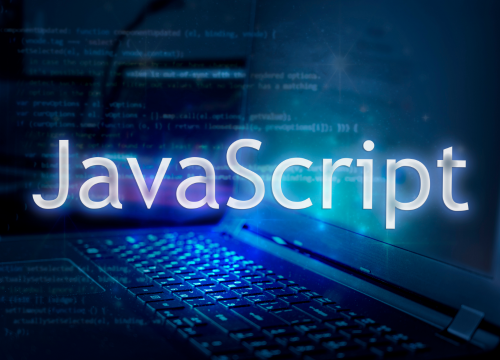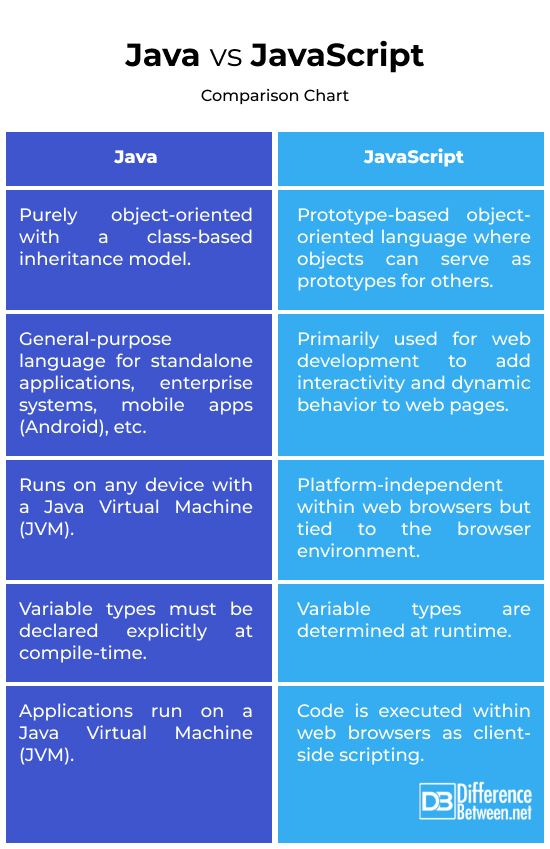Difference Between Java and JavaScript
Java and JavaScript are both powerful programming languages that play distinct roles in the world of technology. While both share some syntactical similarities, they serve different purposes in the field of software development. Understanding the differences between Java and JavaScript is crucial for web developers and those looking to hone their skills in various domains. So, let’s get started.

What is Java?
Java is a versatile, object-oriented programming language developed by Sun Microsystems (now owned by Oracle). Java is a class-based programming language that’s designed to be platform-independent. It is known for its “write once, run anywhere” (WORA) philosophy, meaning that code written in Java can run on any device that has a Java Virtual Machine (JVM).
Java is a widely-used server-side programming language used for developing a wide range of applications, from enterprise-level systems to mobile applications, server applications, and embedded devices.

What is JavaScript?
JavaScript is a lightweight, interpreted scripting language primarily used for web development. Unlike Java, JavaScript runs in web browsers, allowing developers to create dynamic and interactive web pages. Unlike compiled languages, where the entire code is translated into machine code before execution, JavaScript code is read and executed on the fly, without a separate compilation step.
JavaScript is a dynamically typed language, meaning that variable types are determined at runtime. It is often used in conjunction with HTML and CSS to enhance the user experience by adding functionality and interactivity to websites. JavaScript has become essential for front-end development and is widely used in building modern web applications.
Difference between Java and JavaScript
Object-Oriented Paradigm
Java is a purely object-oriented programming language, where everything is treated as an object. It follows a class-based inheritance model. JavaScript, on the other hand, is a prototype-based object-oriented language. Objects can serve as prototypes for other objects, and inheritance is achieved through the prototype chain.
Static vs. Dynamic
Java is a statically-typed language, which means that variable types must be declared explicitly at compile-time. The type of a variable is known at compile-time and cannot change during runtime. JavaScript is dynamically typed, which allows variables to hold values of any type. Variable types are determined at runtime, providing more flexibility but requiring careful handling to avoid unexpected behavior.
Execution
Java applications are executed on a Java Virtual Machine (JVM), which provides a layer of abstraction between the application and the underlying hardware. JavaScript code, however, is executed within web browsers, making it a client-side scripting language. Modern JavaScript engines, like V8, interpret and optimize the code for efficient execution in the browser.
Platform Dependency
Java is designed to be platform-independent, thanks to its “write once, run anywhere” philosophy. Java code is compiled into bytecode, which runs on any device with a Java Virtual Machine (JVM). JavaScript is platform-independent in the sense that it runs on any web browser. However, it is tied to the browser environment and does not have the same cross-platform capabilities as Java.
Use Cases
Java is a versatile, general-purpose programming language used for building standalone applications, enterprise-level systems, mobile applications (Android), and more. It is not limited to web development. JavaScript, on the other hand, is a scripting language primarily used for web development. It adds interactivity and dynamic behavior to web pages and is executed in web browsers.
Java vs. JavaScript: Comparison Chart

Summary
In a nutshell, Java is a general-purpose programming language with a focus on cross-platform compatibility, whereas JavaScript specializes in client-side scripting for web development. Understanding these distinctions is crucial for developers choosing the right language for specific tasks, as Java and JavaScript serve different purposes and excel in different domains within the world of programming.
FAQs
Is it better to learn Java or JavaScript?
Well, it depends; if you’re interested in web development, learning JavaScript is essential. For general-purpose programming, especially for building large-scale applications, Java might be a better choice.
What is the difference between JavaScript and Java variables?
Java is statically typed, meaning variable types are declared and known at compile-time. JavaScript is dynamically typed, allowing variables to hold values of any type, and their types are determined at runtime.
Which is better, Java, JavaScript, or Python?
Java is good for building large-scale applications, JavaScript for web development, and Python for its simplicity and versatility. So, the choice depends on the type of projects you want to work on.
Is Java a good first language?
Java is a viable first language. It enforces good programming practices, has a strong community, and is widely used in industry. However, the choice of a first language depends on your learning goals and the type of projects you want to tackle.
Is JavaScript harder than Java?
Some find JavaScript easier for beginners due to its forgiving nature and dynamic typing. Java, with its stricter syntax, may have a steeper learning curve for some.
Is Python same as Java?
No, Python and Java are different programming languages. While they share some syntax similarities, they have distinct purposes, strengths, and use cases.
Is Java outdated in 2023?
No, Java is still widely used, especially in enterprise applications.
Is Java easy or Python?
Some find Python easier due to its readability and simplicity, while others appreciate Java’s strict syntax for learning good programming practices. However, both languages are beginner-friendly.
Is one month enough to learn Java?
It depends on your prior programming experience and the depth of understanding you seek. One month may be sufficient to grasp the basics and start working on simple projects, but becoming proficient may take longer.
- Difference Between Caucus and Primary - June 18, 2024
- Difference Between PPO and POS - May 30, 2024
- Difference Between RFID and NFC - May 28, 2024
Search DifferenceBetween.net :
5 Comments
Trackbacks
- Difference Between jQuery and AJAX | Difference Between
- Difference Between JRE and SDK | Difference Between | JRE vs SDK
- Difference Between Java and C++ | Difference Between | Java vs C++
- Difference Between Abstract Class and Interface | Difference Between | Abstract Class vs Interface
Leave a Response
References :
[0]Flanagan, David. JavaScript: The Definitive Guide. O’Reilly Media, 2002.
[1]Davis, Adam L. Modern Programming Made Easy: Using Java, Scala, Groovy, and JavaScript. Apress, 2020.
[2]Wilton, Paul and Jeremy McPeak. Beginning JavaScript. John Wiley and Sons, 2011.
[3]Image credit: https://www.canva.com/photos/MAEM5o_yO4I-javascript-inscription-against-laptop-and-code-background-learn-javascript-programming-language-computer-courses-training-/
[4]Image credit: https://www.canva.com/photos/MADV-btY8IA-java-programming-concept-virtual-machine-on-server-room-background-/

Java and JavaScript refer to the same language OOP, they use same control structures, operators etc; and comments of JavaScript are same as Java. Many thanks for sharing this clear difference between both.